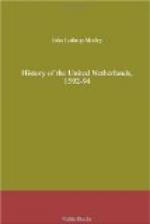On the conclusion of his Rouen campaign he had returned to the Netherlands, almost immediately betaking himself to the waters of Spa. The Marquis de Cerralbo meanwhile had been superseded in his important secret mission by the Count of Fuentes, who received the same instructions as had been provided for the marquis.
But ere long it seemed to become unnecessary to push matters to extremities. Farnese, although nominally the governor, felt himself unequal to take the field against the vigorous young commander who was carrying everything before him in the north and east. Upon the Mansfelds was the responsibility for saving Steenwyk and Coeworden, and to the Mansfelds did Verdugo send piteously, but in vain, for efficient help. For the Mansfelds and other leading personages in the obedient Netherlands were mainly occupied at that time in annoying Farnese, calumniating his actions, laying obstacles in the way of his administration, military and civil, and bringing him into contempt with the populace. When the weary soldier—broken in health, wounded and harassed with obtaining triumphs for his master such as no other living man could have gained with the means placed at his disposal—returned to drink the waters, previously to setting forth anew upon the task of achieving the impossible, he was made the mark of petty insults on the part of both the Mansfelds. Neither of them paid their respects to him; ill as he was, until four days after his arrival. When the duke subsequently called a council; Count Peter refused to attend it on account of having slept ill the night before. Champagny; who was one of, the chief mischief-makers, had been banished by Parma to his house in Burgundy. He became very much alarmed, and was afraid of losing his head. He tried to conciliate the duke, but finding it difficult he resolved to turn monk, and so went to the convent of Capuchins, and begged hard to be admitted a member. They refused him on account of his age and infirmities. He tried a Franciscan monastery with not much better success, and then obeyed orders and went to his Burgundy mansion; having been assured by Farnese that he was not to lose his head. Alexander was satisfied with that arrangement, feeling sure, he said, that so soon as his back was turned Champagny would come out of his convent before the term of probation had expired, and begin to make mischief again. A once valiant soldier, like Champagny, whose conduct in the famous “fury of Antwerp” was so memorable; and whose services both in field and-cabinet had, been so distinguished, fallen so low as to, be used as a tool by the Mansfelds against a man like Farnese; and to be rejected as unfit company by Flemish friars, is not a cheerful spectacle to contemplate.
The walls of the Mansfeld house and gardens, too, were decorated by Count Charles with caricatures, intending to illustrate the indignities put upon his father: and himself.




